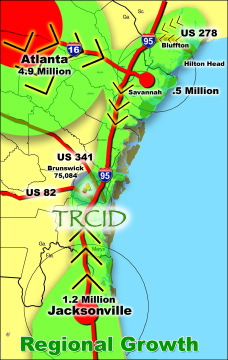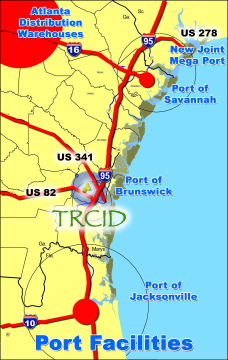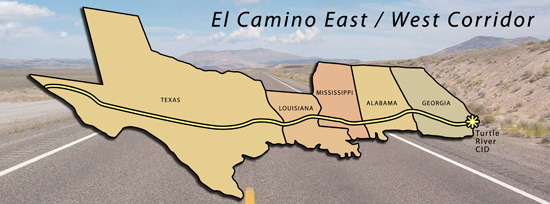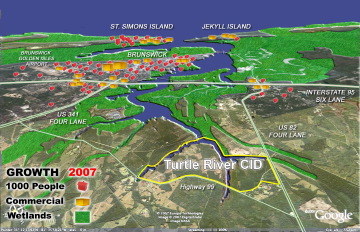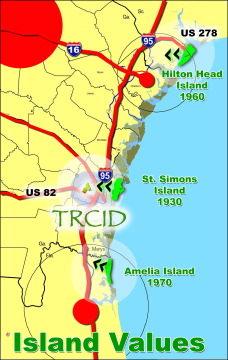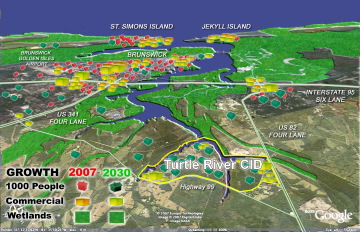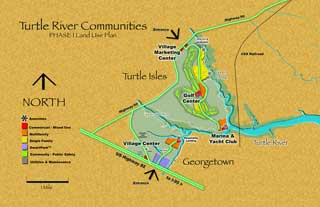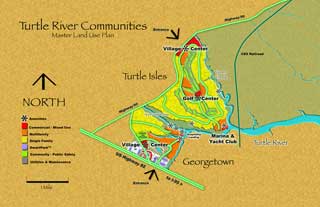 |
||
|
COASTAL GEORGIA INVESTMENT OPPORTUNITY Coastal Georgia, the home of Turtle River Communities, is anchored on the North, South and Northwest by three metropolitan growth and regional service areas - Savannah/Hilton Head/Bluffton, Jacksonville and Atlanta. Glynn County is midway or one hour between the two coastal markets as well as one hour flying time from Atlanta’s Hartsfield International airport. Growth factors from these three urban areas are fueling sustained growth in Brunswick and Glynn County. Significant Federal and state investments are expanding Interstate 95 to six lanes throughout coastal Georgia and growing the container port of Savannah beyond its second place position on the east coast, while private investment is helping to grow new communities, transform older communities and serve growing population and business needs. GLOBAL TRADE Global trade drives the American economy more than any other sector. World import and Georgia and South Carolina governments are now planning to develop a new joint mega port at the entrance to the Savannah River. This will accommodate larger shipping routes to and from Asia/China, Latin American and European Markets. LOGISTICS HUB The Turtle River Community is bounded by Highway 82 and State Highway 99 in Glynn County, Georgia. Located in close proximity to I-95 and the port in Brunswick, the site offers great access to various modes of transportation. From the Golden Isles all the way through five states it enables delivery to over 80% of the U.S. population. With its strategic location in Brunswick, Georgia, the Turtle River Global Logistics Park is well positioned to be a key part of any supply chain network. While Brunswick has deep roots in the timber/forest products sector as well as in seafood harvesting and processing, recent additions to the industrial landscape include manufacturers involved in the production of aircraft, maritime vessels, vehicles, chemical supplies and construction materials. The Turtle River concept encourages innovation and energy independence both in industrial processes and lifestyle choices to create a unique environment for work and play. With the globalization of the economy the Georgia ports have grown in position and significance over the years. World import and export container shipping into the United States is now favoring routes to East Coast ports because of west coast congestion and faster distribution to the larger eastern population. click to enlarge (Graphic: El Camino Corridor) Railroads, highways, airports, sea ports provide connections to a national and global supply chain. Highway 82 connects to all points west along the El Camino Corridor facilitating transport through four other states and to the NAFTA highway in Texas which provides the North-South connection to Canada and Mexico. Georgia’s low tax rates and impressive variety of both statutory and negotiated incentives encourage new growth and assist eligible businesses to attain their goals. With educational opportunities and training for specific industries, Turtle River Global Logistics Park is the perfect location for business. Brunswick and the Golden Isles (see www.georgiasgoldenopportunity.com) offer an attractive and competitive incentive package to new and expanding industries, including revenue bond financing and low interest loans through the Coastal Area District Development Authority. In addition, the 100% Freeport and ad valorem tax exemption on raw materials, goods in progress, and finished goods bound for out-of-state shipment serve to improve the bottom line for most companies.
TECHNOLOGY CENTERS Georgia, a leader in technology and transportation for the past century, is now focused on technology and innovation for the next one. Georgia’s Centers of Innovation stand ready to support logistics, aviation, energy and agribusiness in the Golden Isles. Investment in the local university colleges and technical schools are designed to make them training grounds for new technologies to support industry locating in Glynn County. The natural and cultural resources of Coastal Georgia makes the region easy to attract and sustain higher and better residential and business markets from other regions and countries. Coastal Georgia is becoming multi-cultural and multi-disciplined in growing higher education, business, technology and natural resource preservation. GLYNN COUNTY Throughout history the coast of Georgia has attracted very wealthy individuals who desired the natural beauty, seclusion and privacy of the coast. On Jekyll Island names like Astor, Vanderbilt, Morgan, Pulitzer, Rockefellers, Macys, Goodyear, DuPont and Gould filled the Jekyll club's register. The Federal Reserve of the United States was formed in a meeting on the island in 1910. In 1915 the first transcontinental phone call was placed from Jekyll by Theodore Vail, first president of AT &T. President Woodrow Wilson in Washington, Alexander Graham Bell in New York City, spoke with banker J. P. Morgan on Jekyll Island along with other members of the Jekyll Club. Nearby Cumberland Island was home to members of the Carnegie family who built US Steel and whose houseguests included Henry Ford and Thomas Edison. Glynn County, Georgia contains the highest value vacation experiences in coastal Georgia and among the most desirable in the Nation. The Cloister at Sea Island and remote Little St. Simons Island have been favorite retreats for Fortune 500 CEOs and heads of State for over a century including several US Presidents. The charm and beauty of the Golden Isles of Georgia is well known amongst world renowned travelers, naturalists, artists outdoorsmen and scientists. There is a high respect for the natural subtropical habitat and marine environment. W Glynn County with a population of 75,000 includes several communities including the City of Brunswick, St. Simons Island, Jekyll Island and the Turtle River Communities and Improvement District (TR-CID). Brunswick, the county seat, is a port city with a population of 17,000 founded with Savannah, St. Simons Island and Darien when Georgia was colonized in the 1700s. St. Simons has grown from its plantation origins into a peaceful community of 15,000 people. Jekyll Island is a state owned park and resort. Both Islands and Brunswick are saturated and undergoing redevelopment. GROWTH TRENDS
Glynn county, like these other barrier island communities, first saw high value development beginning on the islands of St. Simons and Sea Island. As the islands became saturated, the high demographic markets began moving across the marshes and rivers to the mainland following major access routes and in particular the US 82 corridors. The completion of the Sidney Lanier Bridge provides a spectacular gateway moving from the islands to I-95/Exit 29 and the Turtle River Communities as well as opening the port of Brunswick to world trade. The economy of Glynn county is diversified around manufacturing, shipping, resort/hospitality, tourism, services, education, agriculture, forestry, marine fishing, medical, government, construction and real estate. Of particular note is the Federal Law Enforcement Training Center, a key facility of the Department of Homeland Security and the Sea Island Company, a world class resort community developer. FUTURE GROWTH The October 2006, Georgia Tech published Georgia Coastal 2030 Population Projections for the 10 county coastal region. The study projected a TURTLE RIVER CID The Turtle River Communities and Improvement District is the first non-metro CID (Community Improvement District) in the state of Georgia dedicated to planned, sustainable mixed-use to support business and community development. The concept promotes preservation of the habitat and leverages opportunities in today’s market to create better economic conditions and jobs in Glynn County. The Turtle River CID, a partnership between the developer/property owner and the Glynn County government, is authorized by the legislature to use bond funding to build the infrastructure for Georgetown and Turtle Isles workplace communities. The Turtle River CID development program enables the developer to leverage the estima The Turtle River CID is also the beginning of a strategic opportunity to direct quality growth into an expandable infrastructure district of approximately 30,000 acres. CONCLUSION The preceding narrative supports the forecast and strategy for positioning the Turtle River-CID in 2011 and beyond as The multiple land use strategies and development programs will position the TR-CID as a compelling and sustainable Coastal Georgia workplace, lifestyle and habitat community. The next growth cycle belongs to Coastal Georgia. |
|
|
|
|
|
|
